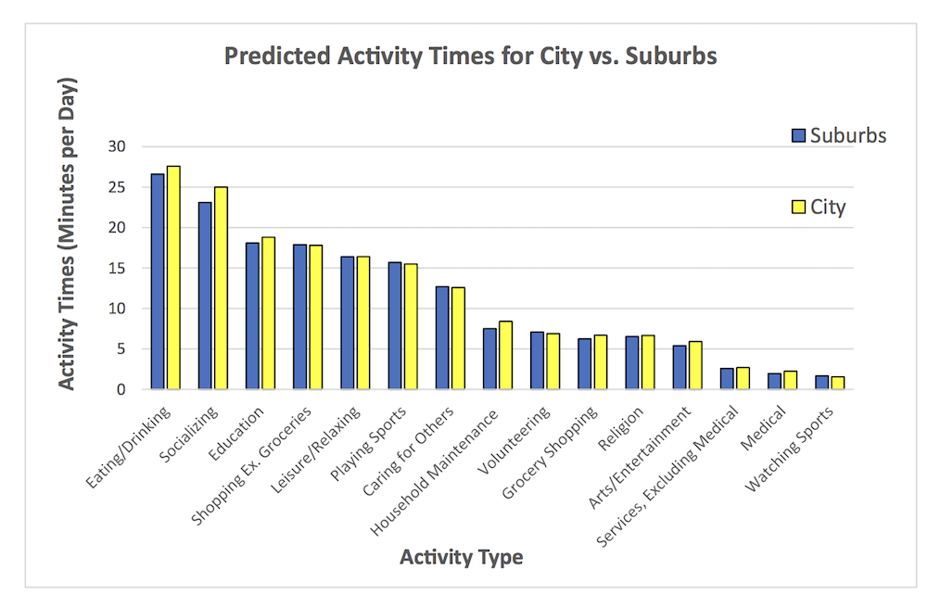Urban and Suburban Lifestyles Are More Similar Than You’d Think

City residents don't spend any less time on daily travel than suburbanites—in fact, they spend more, according to recent research. Shutterstock
A new study finds strong similarities in how residents of U.S. cities and suburbs spend their time—with one, counterintuitive difference.
People who live in cities spend their time eating in restaurants, visiting art galleries, attending concerts, and hanging out with friends; they walk or take transit for short commutes to work. Americans who live in suburbs don’t socialize as much, are less physically active, and have long car commutes.
We all have our convenient stereotypes. Now, a new study has come along to bust some of these apart. Eric A. Morris, who teaches urban planning at Clemson University, has found that urbanites and suburbanites are remarkably similar in how they apportion their time on a day-to-day basis.
In his study—the basis of a paper published recently in the journal Cities—Morris used data from the American Time Use Survey (ATUS), which is conducted annually by the U.S. Census Bureau and Bureau of Labor Statistics, and covers some 13,500 Americans per year. It asks them detailed questions about how they spent their time on the day before being surveyed, and how happy or satisfied they are with their daily lives.
Morris looks at the amounts of time that urbanites and suburbanites respectively devote to 18 daily activities. The study uses the standard census categories to distinguish urbanites—those living in the principal cities of metro areas—from suburbanites, those residing in metros, but outside of principal cities. All of the ATUS respondents included in the study live in Metropolitan Statistical Areas, roughly 61 percent in suburbs, and 39 percent in principal cities. That distribution almost exactly matches the distribution in the 2010 U.S. Census.
Morris’s findings challenge ingrained stereotypes. First and foremost, it turns out there is very little difference in how urbanites and suburbanites who are demographically similar spend their time. Both the composition of their activities and the amount of time they devote to them are remarkably similar.
Morris finds no significant association between location and how people allocate their time across 11 of the 18 activities. As to the other activities, on a given day, city dwellers are slightly more likely to leave home, do work, or shop for groceries. Suburbanites are considerably more likely to engage in exercise, sports, and outdoor activities.
Even when there are differences in the ways that city and suburb residents spend their time, they tend to be quite small. For example, although urbanites are a bit more likely to leave home, that only translates into about three more minutes of out-of-home time per day than suburbanites, according to the study’s models. Urbanites spend two extra minutes socializing. And they spend about half a minute more on grocery shopping, and taking in arts and culture.
The differences remain small even when Morris compares the residents of a subset of six large, dense, and dynamic cities (including Boston, Chicago, and San Francisco) to other respondents.

The biggest difference is in time spent traveling, mainly comprised of commuting to and from work. Here, the results are counterintuitive. We typically think of suburbanites enduring long, lonely car commutes, and urbanites walking to work or hopping onto subways, trains, and other forms of transit. There’s evidence that a catalyst of the back-to-the-city movement was people’s desire to reduce their commutes to have more time to spend with family and friends.
But the reality is that city dwellers devote substantially more time to travel then suburbanites. In fact, residents of the six large, lively cities mentioned above spend more time on travel—15 percent more, or between nine and 12 minutes a day. This could reflect high traffic congestion or long transit rides in these metros. As the paper notes:
[I]t would seem that residence in a principal city of a metro area with a thriving center does not offer materially better access to most opportunities, and in fact the opposite might be true: those in principal cities with large and thriving centers are engaging in a similar amount of out-of-home activities compared with others, but are taking considerably longer to travel to and from those activities.
To find out whether urban versus suburban residence might have particular effects on people with low incomes, Morris looks specifically at that group, defined as individuals with incomes of less than $15,277 or a family of four with less than $32,081. While poor people get about an hour less of activity per day than the non-poor (a finding in line with other research), there is little difference in the ways the urban and suburban poor allocate their time. In urban areas, low-income people spend more time traveling, and those who work spend less time working than their suburban counterparts.
So how does this all translate into happiness? Are urbanites or suburbanites more satisfied with their day-to-day lives? To get at this, the study uses data from survey questions that ask respondents to rate their overall quality of life and experiences of feeling happy, sad, in pain, fatigued, and stressed, and their sense of meaningfulness.
Again, urbanites and suburbanites are more alike than different. Across the board, people are happier when they spend more time on five activities: eating and drinking; exercise and outdoor pursuits; arts and culture; volunteering; and religious participation. The upshot is that suburbanites tend to have modestly higher levels of meaning, happiness, and life satisfaction. By contrast, urbanites in the six largest cities have lower levels of meaning than urbanites in general.
The mild differences between suburbanites and urbanites largely boil down to the satisfaction that suburbanites derive from three activities: caring for others; leisure/relaxation; and exercise, sports, and outdoor recreation. There is no significant association between suburban versus urban location and stress or sadness. Morris concludes that, “in the aggregate, the suburbs may offer a modestly but measurably higher quality of life.”
When it comes to how we spend our time, then, America’s urban and suburban residents have more in common than not. In Morris’s words: ”[S]uburbanites and urbanites may live far more similar lifestyles than advocates of either geography may believe.”
Richard Florida is a co-founder and editor at large of CityLab and a senior editor at The Atlantic.
NEXT STORY: Did Body Cameras Backfire?





